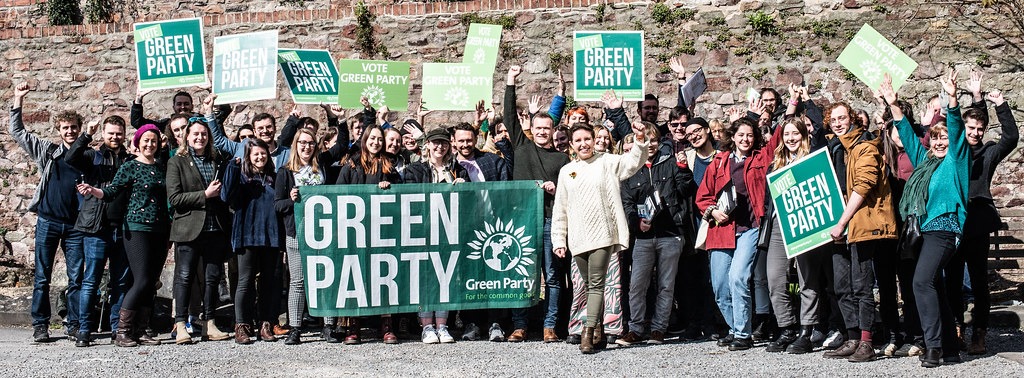What’s next for the Green Party?
There is no doubt that the Green party achieved unprecedented success in the 2024 July election, winning 4 seats and coming second place in 40 constituencies. It was a glimmer of hope for those who support Left-wing politics, but felt that the Labour Party had abandoned its core principles and voting base. For example, Labour ruled out introducing a wealth tax back in August 2023, choosing to focus on growth and the corporate sector, rather than reducing economic and social inequalities. The Greens have also been praised by supporters of the Palestinian cause for being the only mainstream political party in the UK to condemn Israel’s genocide in Gaza.
Ananya Shah, Editor-in-Chief of Warwick University-based publication ‘GLOBUS,’ and voter in Bristol Central, describes her reaction to Carla Denyer’s victory in 2024:“It felt incredibly rewarding. Knowing that the people had voted in someone who genuinely has the people of Bristol’s best interests at heart. Carla Denyer best represents the people of Bristol and what we stand for; a city that championed the BLM protests in the area, a city that welcomed in Greta Thunberg during the ‘School Strike for Climate’.”
However, in recent months, the Green Party have been largely sidelined from mainstream political discussions, and do not seem to have a clear post-election plan. This begs the question – what has changed since last summer? Reform UK is a useful benchmark for measuring the Green Party’s success since the election. Both minor parties won 4 seats at the last election and came second in a significant number of constituencies. However, Reform has undoubtedly remained at the forefront of UK politics after the election ended, unlike the Green Party.
A YouGov poll in January 2025 placed Reform ahead of the Conservatives and marginally behind Labour. Perhaps part of their success is due to their political alignment with GB News. This news outlet has been at the centre of various controversies, including reports that they have repeatedly targeted and demonised Muslims in their coverage in recent years. Nigel Farage, leader of Reform UK, has also been growing closer to President Trump. This has propelled Reform’s right-wing discourse forward in mainstream British media. Reform and Green occupy almost parallel roles on the UK political stage – where the two major parties have failed to capture their traditional voting bases, both minor parties have had the opportunity to step in and represent the issues that voters care most about. But the Green Party could be doing more to maintain the momentum they had among voters in the summer.
Their policies already tend to appeal to Gen Z, but they have failed to truly capitalise on this support since the election ended
Some have blamed the Green Party’s social media campaigns, described as poor quality and uninteresting, as the reason for their lack of success since the election. I don’t think that this is a major concern for the Greens, however. Social media campaigns are almost always run to capture the attention of young people, and yet the Greens have still managed to gain solid support among 18 to 24-year-olds in the recent election. Their policies already tend to appeal to Gen Z, but they have failed to truly capitalise on this support since the election ended.
Historically, the Green Party have both presented themselves and been viewed as a party that focuses primarily on environmental issues. Climate change and the environment remain central to the party’s ethos today, but debates on climate change have evolved over the last few decades, increasingly placing capitalism as the cause of global warming. For example, in their 2024 manifesto, the Greens recognised that companies need further regulation and government support to encourage decarbonisation. The Greens’ push to increase state intervention in the economy to support climate action demonstrates that they have solidified their place in the left as not simply one of the environment.
The Green Party has the potential to become a much larger political force in the UK, but they need a clearer stance
Their 2024 manifesto was rife with policies that grassroots Labour campaigners have pushed their party to endorse, such as introducing a wealth tax and abolishing university tuition fees. When considering the deepening ties between general left-wing politics and climate activism alongside the Labour Party’s broad shift to the centre-right since 1997, it is clear that the Green Party’s position on the political landscape has changed; they are the ‘true’ voice of the socialist left. The issue is that they are unwilling to take advantage of their potential to be more than just a single-issue party. A focused, re-energised Green Party has a serious chance at pushing public representation into Parliamentary debates.
The Green Party has the potential to become a much larger political force in the UK, but they need a clearer stance. The Labour Party needs to feel threatened enough by the Greens that they re-incorporate truly left-wing policies into their agenda, or else they may end up in a similar position to the Conservative Party. Institutional constraints on the Green Party, primarily the First Past the Post voting system, do hinder the extent to which they can achieve true electoral success. But by reinvigorating the party and directly appealing to disillusioned Labour supporters, the Greens stand a real chance at positioning themselves as a strong left-leaning opposition to the Labour government, thus strengthening democracy in the UK.

Comments (1)
Very interesting article – makes one ponder and reconsider the current political climate of the UK. The Greens as the new face of the Left is something worth genuinely thinking about.